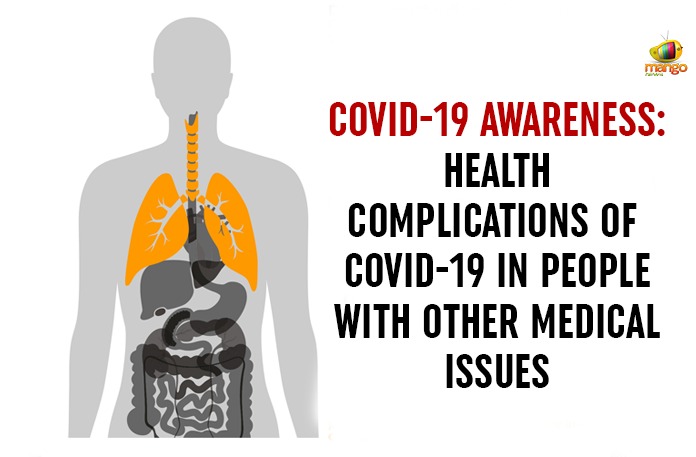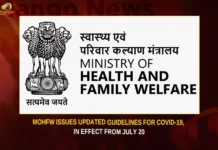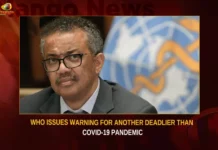The Novel Coronavirus or COVID-19, declared as pandemic disease have several health complications and issues with people of different medical history or existing medical condition.
People of any age with certain underlying medical conditions are highly exposed to the severe effects of the deadly virus.
Some of the increased risk for severe illness from COVID-19 include, chronic kidney disease, breathing problems, lungs infection and others.
Some of the disease or medical conditions which have high risk of catching the virus with severe effects are:
- Cancer
- Chronic kidney disease
- COPD (chronic obstructive pulmonary disease)
- Immunocompromised state (weakened immune system) from solid organ transplant
- Obesity (body mass index [BMI] of 30 or higher)
- Serious heart conditions, such as heart failure, coronary artery disease, or cardiomyopathies
- Type 2 diabetes mellitus
- Pregnancy
- Asthma (moderate-to-severe)
- Cerebrovascular disease (affects blood vessels and blood supply to the brain)
- Hypertension or high blood pressure
- Immunocompromised state (weakened immune system) from blood or bone marrow transplant, immune deficiencies, HIV, use of corticosteroids, or use of other immune weakening medicines
- Neurologic conditions,
- Liver disease
- Pulmonary fibrosis (having damaged or scarred lung tissues)
- Smoking
- Thalassemia (a type of blood disorder)
- Type 1 diabetes mellitus
In general, the COVID-19 infection is dangerous for children and senior citizens. However, considering the released data, people with low immune system and underlying medical conditions are also at risk, if infected by the Novel Coronavirus.
In regard to this, reducing risk of getting COVID-19, especially for people at increased risk of severe illness is very important.
Some of yhe best way to protect yourself and to help reduce the spread of the virus that causes COVID-19 are:
- Limit your interactions with other people as much as possible.
- Take precautions to prevent getting COVID-19 when you do interact with others.
- If you start feeling sick and think you may have COVID-19, get in touch with your healthcare provider within 24 hours.
- Do not venture out in public if not an emergency.
- Follow social distancing strictly
- Wear face mask
- Use sanitizer
However, f you decide to engage in public activities, continue to protect yourself by practicing everyday preventive actions.
Keep these items on hand and use them when venturing out: a mask, tissues, and a hand sanitizer with at least 60% alcohol, if possible.
If possible, avoid others who are not wearing masks or ask others around you to wear masks.
In general, the more people you interact with, the more closely you interact with them, and the longer that interaction, the higher the risk of COVID-19 spread.
Speaking about friends and family outdoors, avoiding any gathering or meeting would be a better way, if one is suffering from any of the medical conditions mentioned above.
If this is not feasible, make sure the room or space is well-ventilated (for example, open windows or doors) and large enough to accommodate social distancing.
Try to avoid close contact with your visitors like, avoid hand shakes or hugs. Instead wave and verbally greet them.
Carry your own water and food if necessary and encourage your visitors to bring their own food and drinks.
Clean and disinfect commonly touched surfaces and any shared items between use.
If you choose to use any shared items that are reusable (e.g., seating covers, tablecloths, linen napkins), wash, clean, and sanitize them after the event.
What are the major issues of underlying health conditions?
Cancer
Having cancer currently increases your risk of severe illness from COVID-19. At this time, it is not known whether having a history of cancer increases your risk.
Actions to take:
Have a conversation with your healthcare provider or care team to discuss your individual level of risk based on your condition, your treatment, and the level of transmission in your community.
Do not stop taking your medicines or alter your treatment plan without talking to your healthcare provider.
Make sure that you have at least a 30-day supply of your medicines.
Do not delay life-saving treatment or emergency care.
Call your healthcare provider or care team if you have concerns about your condition, your treatment, think you may have been exposed to COVID-19, or any other questions.
For more information on preventing infections for people with cancer.
Chronic kidney disease
Having chronic kidney disease of any stage increases your risk for severe illness from COVID-19.
Actions to take
Continue your medicines and your diet as directed by your healthcare provider.
Make sure that you have at least a 30-day supply of your medicines.
Stay in contact with your healthcare team as often as possible, especially if you have any new signs or symptoms of illness. Also reach out to them if you can’t get the medicines or foods you need.
If you don’t have a healthcare provider, contact your nearest community health centerexternal icon or health department.
Have shelf-stable food choices to help you follow your kidney diet.
If you are on dialysis:
Contact your dialysis clinic and your healthcare provider if you feel sick or have concerns. Do not miss your treatments or dialysis.
Diabetes
Having type 2 diabetes increases your risk of severe illness from COVID-19. Based on what we know at this time, having type 1 or gestational diabetes may increase your risk of severe illness from COVID-19.
Actions to take
Continue taking your diabetes pills and insulin as usual.
Test your blood sugar and keep track of the results, as directed by your healthcare provider.
Make sure that you have at least a 30-day supply of your diabetes medicines, including insulin.
Follow your healthcare provider’s instructions if you are feeling ill as well as the sick day tips for people with diabetes.
Call your healthcare provider if you have concerns about your condition or feel sick.
If you don’t have a healthcare provider, contact your nearest community health centerexternal icon or health department.
Liver diseas
Having chronic liver disease, especially cirrhosis (scarring of the liver), may increase your risk for severe illness from COVID-19.
Actions to take
Take your medicines exactly as prescribed.
Make sure that you have at least a 30-day supply of your medicines.
Call your healthcare provider if you have concerns about your condition or feel sick.
If you don’t have a healthcare provider, contact your nearest community health centerexternal icon or health department.
Pregnancy
Based on what we know at this time, pregnant people might be at an increased risk for severe illness from COVID-19 compared to non-pregnant people. Additionally, there may be an increased risk of adverse pregnancy outcomes, such as preterm birth, among pregnant people with COVID-19.
Actions to take
Do not skip your prenatal care appointments.
Make sure that you have at least a 30-day supply of your medicines.
Talk to your healthcare provider about how to stay healthy and take care of yourself during the COVID-19 pandemic.
If you don’t have a healthcare provider, contact your nearest community health centerexternal icon or health department.
Call your healthcare provider if you have any questions related to your health.
Seek care immediately if you have a medical emergency.
You may feel increased stress during this pandemic. Fear and anxiety can be overwhelming and cause strong emotions. Learn about stress and coping.
Serious Heart Conditions and Other Cardiovascular and Cerebrovascular Diseases
Having any of the following serious heart conditions increases your risk of severe illness from COVID-19:
Heart failure
Coronary artery disease
Cardiomyopathies
Pulmonary hypertension
Having other cardiovascular or cerebrovascular disease, such as hypertension (high blood pressure) or stroke, may increase your risk of severe illness from COVID-19.
Actions to take
Take your medicines exactly as prescribed and follow your healthcare provider’s recommendations for diet and exercise while maintaining social distancing precautions.
Continue angiotensin converting enzyme inhibitors (ACE-I) or angiotensin-II receptor blockers (ARB) as prescribed by your healthcare provider for indications such as heart failure or high blood pressure.
Make sure that you have at least a 30-day supply of your heart disease medicines, including high cholesterol and high blood pressure medicines.
Call your healthcare provider if you have concerns about your condition or feel sick.
If you don’t have a healthcare provider, contact your nearest community health centerexternal icon or health department.
Do not delay life-saving treatment or emergency care.
Neurologic conditions such as dementia
Having neurologic conditions such as dementia may increase your risk of severe illness from COVID-19.
Actions to take
Take your medicines as prescribed.
Make sure that you have at least a 30-day supply of your medicines.
Call your healthcare provider if you have concerns about your condition or feel sick.
If you don’t have a healthcare provider, contact your nearest community health centerexternal icon or health department.
Smoking
Being a current or former cigarette smoker may increase your risk of severe illness from COVID-19.
Actions to ta
If you currently smoke, quit. If you used to smoke, don’t start again. If you’ve never smoked, don’t start.
Counseling from a healthcare provider and Food and Drug Administration (FDA)-approved medications can double the chances of quitting smoking.
For help quitting smoking, call 1-800-QUIT-NOW or visit smokefree.govexternal icon.
Call your healthcare provider if you have concerns or feel sick.
If you don’t have a healthcare provider, contact your nearest community health centerexternal icon or health department.
Children with Certain Underlying Conditions
While children have been less affected by COVID-19 compared to adults, children with certain conditions may be at increased risk for severe illness. Children who are medically complex, who have serious genetic, neurologic, metabolic disorders, and with congenital (since birth) heart disease might be at increased risk for severe illness from COVID-19. Similar to adults, children with obesity, diabetes, asthma and chronic lung disease, or immunosuppression might be at increased risk for severe illness from COVID-19. CDC is investigating a rare but serious complication associated with COVID-19 in children called Multisystem Inflammatory Syndrome in Children (MIS-C). We do not yet know what causes MIS-C and who is at increased risk for developing it. Learn about MIS-C.
Actions to take
Give medicines as prescribed for your child’s underlying conditions.
Make sure that you have at least a 30-day supply of your child’s medicines.
Call your child’s healthcare provider if you have concerns and to discuss your child’s specific conditions and risk for severe illness from COVID-19.
Well-child visits and vaccines are still important during the COVID-19 pandemic. Stay in contact with your child’s healthcare provider and make sure your child is up to date with vaccines to prevent other diseases. Learn more about how to protect yourself and your family during the COVID-19 pandemic.
If you don’t have a healthcare provider, contact your nearest community health centerexternal icon or health department.
People with Multiple Underlying Conditions
The more underlying medical conditions someone has, the greater their risk is for severe illness from COVID-19.
Actions to take
Continue your medicines and treatment plans as directed by your healthcare provider.
Make sure that you have at least a 30-day supply of your medicines.
Call your healthcare provider if you have any concerns or feel sick.
If you don’t have a healthcare provider, contact your nearest community health centerexternal icon or health department.
Meanwhile, India crossed 26 lakh cases of the Novel Coronavirus and globally, the virus infected more than 22 millions.
Stay tuned for further updates about the Novel Coronavirus disease.



































